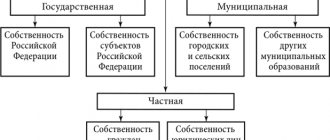The concept and subject of an agreement for the exchange of real estate
According to Article 130 of the Civil Code of the Russian Federation, real estate includes land plots, structures, and buildings. All objects inseparably connected to the ground, the movement of which is impossible without destruction. This category includes both residential premises and non-residential facilities, garages, basements, and parts of buildings. According to this article, the subject of the exchange agreement is determined.
The exchange of real estate is the exchange of real estate between its owners. That is, the rightful owner of an object transfers the rights to own it to another person. In return, he receives ownership of a property of equal value.
Do not confuse barter with exchange. The second is actually moving from one place of residence to another, without transferring rights to real estate. Most often, the exchange is carried out between tenants of objects that belong to the state. In this case, both lease agreements are renegotiated. Thus, exchange is regulated by the Civil Code, and exchange by the Housing Code.
It is impossible to exchange your own housing for state-owned housing, just as it is impossible to make a transaction in the opposite direction.
Apartment exchange agreement
- exchange - transfer of ownership rights by two parties, the object of exchange is housing, registered as a property, and its owners change it;
- the exchange is applicable to apartments used for living under social tenancy agreements. The parties exchanging housing do not have ownership rights to it.
The degree of equivalence of apartments that are objects of exchange is determined by the parties themselves. If the contract provides for the exchange of unequal objects, then the difference is paid in accordance with the provisions of the contract (before or after execution of the transaction, in cash or by bank transfer).
Features of the exchange and terms of the contract
Despite some similarities with the purchase and sale agreement, the document regulating the exchange is significantly different. In this case, each physical party is both a seller and a buyer. According to this, the obligations of the parties include transferring ownership of an object to the other party to the transaction, which is not burdened with any obligations. These may include;
- the right to use the property of a third party;
- pledge;
- joint ownership, etc.
This factor is very important, so be sure to involve a competent notary in drawing up the contract or even ask him for a standard sample. He can find out about problematic objects from a common database, to which only licensed lawyers have access.
This will help avoid a difficult situation when, after concluding an exchange agreement, property transferred into the ownership of one of the parties is alienated by third parties. If this occurs as a result of circumstances that arose before the conclusion of the transaction, then the victim has the right to regain the property that was the object of the agreement on his part. This is only possible if such a possibility was taken into account by the notary when drawing up the legal document.
The contract must also indicate other conditions. These can be any clauses that at the same time do not contradict the definition of an exchange agreement and the legislation of the Russian Federation. This could be renovations to the premises or other improvements to living conditions.
If other persons have the right to use a residential building, apartment or non-residential property legally, then their consent is required to conclude an agreement. In this case, the document must indicate a list of those family members or close people who can also use the owner’s new property as well as the one he exchanged.
If minors are registered in the living space, then a document from the guardianship authorities must be issued for the exchange. It is possible to obtain their consent only if the number of square meters does not decrease, and ideally, if the minor’s living conditions improve during the exchange process.
All these circumstances must be taken into account, otherwise the document may be declared invalid.
Exchange with surcharge - issue price
It was said above about equivalent exchange of real estate. In some cases, objects may be of unequal value. For such transactions, an exchange agreement with an additional payment is provided.
Additional payment is compensation to one of the parties for the lesser value of its property. It can be carried out both in cash and in other valuables:
- additional buildings;
- movable property;
- securities, goods, etc.
The amount of compensation and its form are determined after assessing both objects of the transaction. Most often, an independent appraiser is hired for this purpose. There are many nuances in determining the amount of additional payment. Especially when we are talking about land plots or parts of an object, for example, a share of ownership in an apartment.
Real estate owners are attracted to the barter transaction due to the fact that it is not subject to tax. Payments to the treasury are provided for in the event of receipt of profit, but this agreement is equivalent and does not provide for material benefits. If one of the parties to the transaction must make an additional payment, then the difference is necessarily taxed.
Trying to avoid paying taxes, some owners of the property that will be changed agree on the amount of compensation for the difference among themselves. At the same time, they do not include it in the real estate exchange agreement. This provides an opportunity to avoid paying taxes, but also poses some risk. If a transaction is concluded without the presence of a notary, then there are no guarantees that the owner of a larger object, after concluding the transaction, will receive the additional payment due to him. This condition is another reason to contact a lawyer when drawing up and signing documents.
More serious violations are also possible, from which a highly qualified professional notary will dissuade his clients - too obvious, unequal exchange of additional payment bases. For example, the owner of a good apartment in the city center exchanges his property for an old house in a remote village without additional payment. Such a transaction may raise serious questions from various authorities, including the tax authorities.
MENA (agreement)
A gift agreement is an agreement under which one party (the donor) gratuitously transfers or undertakes to transfer certain property to the other party (the donee), or releases or undertakes to release it from property obligations (Article 572 of the Civil Code of the Russian Federation). Types... ... Accounting Encyclopedia
EXCHANGE - in civil law, an agreement by virtue of which one property is exchanged for another between the parties. After execution of the EXCHANGE agreement, each of the parties loses the right of ownership to the transferred property and acquires such right to... ... Financial Dictionary
Benefits of working with a professional
In jurisprudence, it is not enough to receive an appropriate education. You must have a license to work as a notary in the designated territorial district. This gives not only a professional opportunity to certify exchange agreements and other documents, but also take into account all the conditions when drawing them up.
Atypical cases of exchange require in-depth knowledge of the procedure for processing documents and their registration. Such situations include transactions for the exchange of residential premises for land plots or the exchange of parts of apartments. You need to know that in the latter case, the refusal of the other residents in the apartment to buy out the exchangeable share must be formalized. Such a proposal is legally made in the first place. Without the name of the corresponding document, the future owner may face serious problems, including going to court. And it is possible that the exchange transaction will be declared invalid.
If you want to competently, profitably and quickly exchange an apartment, house, land plot or non-residential property for property of equal or unequal price, then notary Boris Sergeevich Ivanov will help you with this.
Providing all services related to notarial support of transactions, including exchange, and assistance in collecting and processing the necessary packages of documents. Make an appointment and conclude contracts correctly, if necessary, request a sample. Make an appointment
Conducting transactions for the exchange of residential premises between local governments and legal entities
Introduction
Currently, organizations of various organizational and legal forms are constructing multi-apartment residential buildings in already established neighborhoods and areas of settlements on the basis of investment contracts concluded with local governments. Often, such projects involve the resettlement of citizens from old houses to newly built residential buildings by concluding exchange and/or sale agreements with apartment owners for the purpose of further acquisition of ownership of the old residential building by the developer organization.
However, there are also pitfalls with this scheme. For example, how to resettle residents of old houses who occupy residential premises under social tenancy agreements - by concluding an exchange or sale agreement?
Social rental agreement for residential premises
Example. Organization “A” entered into an investment contract with the local government body of city “B”, under the terms of which the developer organization undertakes to build new residential buildings, part of the apartments in which, under exchange agreements, is transferred to the residents of old buildings, which are subsequently subject to demolition after the transfer of ownership to all residential and non-residential premises and in their place new ones are being built. Some of the apartments to be transferred to organization “A” are used by individuals under the terms of a social tenancy agreement. In accordance with the provisions of the Housing Code of the Russian Federation (clause 1 of Article 49), residential premises of the state or municipal housing stock are provided under a social tenancy agreement.
In this case, the main feature of a social tenancy agreement is the provision by the owner of residential premises (which is a local government body, or the Russian Federation, or a constituent entity of the Russian Federation) of the specified premises to a citizen of the Russian Federation who is recognized in the prescribed manner as low-income or has the right to be provided with residential premises under a social tenancy agreement in another on a legal basis.
It should be especially noted that the social tenancy agreement provides for the retention of ownership of residential premises provided to citizens and which is the object of the social tenancy agreement with a local government body, or the Russian Federation, or a constituent entity of the Russian Federation.
At the same time, by paragraph 1 of Appendix 3 to Resolution of the Supreme Council of the Russian Federation dated December 27, 1991 No. 3020-1 on the delimitation of state property in the Russian Federation, the housing stock was classified as municipal property.
Thus, it follows that the ownership of residential premises is retained by the local government body that provided such residential premises to individuals under a social tenancy agreement.
Acquisition of residential premises owned by a local government body by exchanging for privately owned property
Continuation of the example. The local government body of city "B" proposed to organization "A" to resettle residents of old houses from apartments occupied under social tenancy agreements by entering into exchange transactions, the subject of which was to exchange apartments in old houses, which are municipal property, for apartments in new houses, which are the private property of organization "B".
Article 1 of the Federal Law of December 21, 2001 No. 178-FZ “On the privatization of state and municipal property” (hereinafter referred to as the Federal Law of December 21, 2001 No. 178-FZ) establishes that the privatization of state and municipal property is the alienation of property owned for a fee of the Russian Federation (hereinafter referred to as federal property), constituent entities of the Russian Federation, municipalities, in the ownership of individuals and (or) legal entities.
Thus, the acquisition of property, including municipal property, is privatization. At the same time, Article 567 of the Civil Code of the Russian Federation establishes that under an exchange agreement, each party undertakes to transfer one product into the ownership of the other party in exchange for another.
It should be noted that, according to paragraph 2 of the above article, the rules on purchase and sale (Chapter 30 of the Civil Code of the Russian Federation) are applied to the exchange agreement, if this does not contradict the rules of Chapter 31 of the Civil Code of the Russian Federation and the essence of the exchange. In this case, each party is recognized as the seller of the goods that it undertakes to sell, and the buyer of the goods that it undertakes to accept in exchange.
Based on the above norms, we can conclude that the exchange agreement is an agreement under which municipal property is alienated, and, therefore, the organizations that are parties to the exchange agreement are both buyers and sellers.
From the above it follows that the conclusion of exchange agreements regarding municipal real estate is privatization, which must be carried out according to the rules provided for by Federal Law No. 178-FZ of December 21, 2001.
At the same time, attention is drawn to the content of paragraph 1 of Article 13 of the Federal Law of December 21, 2001 No. 178-FZ, which contains a closed list of methods for privatization of state and municipal property, and such a method of privatization as barter is not provided for by the said paragraph.
Moreover, paragraph 5 of this article determines that the privatization of state and municipal property is carried out only by the methods provided for by this Federal Law.
It should also be noted the position of the Supreme Arbitration Court of the Russian Federation, expressed, in particular, in the Determination of July 15, 2009 No. VAS-8814/09 in case No. A52-2101/2008 and consisting in the following: in paragraph 1 of Article 13 of the Federal Law of December 21, 2001 No. 178-FZ lists the methods of privatization of state and municipal property. The exchange of property as a method of privatization is not provided for in the above list.
Taking into account the mandatory provisions of these laws regulating the grounds and procedure for the privatization of state and municipal property, taking into account the purpose of transferring said property to other persons, the courts reasonably satisfied the stated requirement to invalidate the order of the Velikiye Luki city administration dated September 28, 2007 No. 2263-r “On the exchange of property ", according to which the organization was given ownership of a built-in non-residential premises with an area of 71.5 square meters. m on Lenin Ave., 42/34, in exchange for a two-room apartment No. 37 in building 43/26 on Lenin Ave., with an area of 55.5 sq. m., accepted into municipal ownership of the city of Velikiye Luki. m, owned by the organization as private property.
Thus, from the above it follows that the current legislation does not allow the exchange of municipal property for private property, and, moreover, the same prohibition is established by established arbitration practice (see, for example, the Resolution of the FAS of the East Siberian District dated December 29, 2010 in case No. A58-2035 /2010, Resolution of the FAS of the North-Western District dated 04/03/2009 in case No. A52-2101/2008, Resolution of the FAS of the Moscow District dated 06/10/2008 No. KG-A41/4838-08 in case No. A41-K1-10034/05).
Possibility of privatization of residential premises by a legal entity
Part 1 of Article 217 of the Civil Code of the Russian Federation provides that property in state or municipal ownership may be transferred by its owner into the ownership of citizens and legal entities in the manner established by laws on the privatization of state and municipal property.
According to subparagraph 3 of paragraph 2 of Article 3 of the Federal Law of December 21, 2001 No. 178-FZ, the said Federal Law does not apply to the privatization of municipal and state housing stock.
Privatization of municipal or state housing stock is regulated by the Law of the Russian Federation of July 4, 1991 3 1541-1 “On the privatization of housing stock in the Russian Federation.”
The said law of the Russian Federation does not provide for the possibility of transferring residential premises into the ownership of legal entities. This Law regulates relations regarding the free transfer into ownership of citizens of the Russian Federation on a voluntary basis of residential premises occupied by them in the state and municipal housing stock.
The Federal Antimonopoly Service of the East Siberian District, in its Resolution dated November 30, 2010 in case No. A33-2392/2010, indicated that the dormitory privatization transaction was invalid due to its nullity.
The Federal Antimonopoly Service of the Ural District, in its Resolution No. F09 6631/07-C6 dated August 23, 2007, in case No. A76-29040/2006, concluded that, on the basis of the above laws, residential premises cannot be alienated by the municipality into the ownership of legal entities.
A similar conclusion is contained in the Resolution of the FAS of the East Siberian District dated 08/06/2008 No. A58-8943/07-Ф02-3724/08 in case No. A58-8943/07, as well as in the Decision of the Moscow Arbitration Court dated 10/03/2006, 10.10.2006 in case No. A40-46550/06-120-238, left unchanged by the Resolution of the Ninth Arbitration Court of Appeal dated 02.14.2007 No. 09AP-17449/2006-AK, 09AP-17450/2006-AK.
Thus, legal entities do not have the right to privatize housing stock that is in municipal or state ownership.
At the same time, it is noteworthy that local governments often deliberately violated the law, met halfway both development organizations and residents of old houses subject to demolition under the terms of the investment contract, and allowed the exchange of apartments in old houses for apartments in houses built in accordance with the terms of investment contracts.
For example, the Moscow Municipal Housing Committee, by order dated April 20, 1998 No. 93, “On registration of ownership rights to residential premises on the basis of agreements for the transfer of residential premises into the ownership of individuals and legal entities on account of investment in construction under a territorial order, exchange agreements for relocation and transfer agreements during the privatization of housing through district registration centers" not only allowed for this option of relocating citizens from old houses to newly built ones, but also recognized the experiment in registering agreements for the transfer of ownership of residential premises to individuals in the manner of privatization, agreements for the transfer of ownership of individuals and legal entities of residential premises on account of investment in construction according to territorial order, exchange agreements for the resettlement of citizens from a five-story and dilapidated housing stock, successful.
Currently, clause 1.1. Decree of the Moscow Government dated May 26, 2009 No. 491-PP “On the exchange of residential premises in the city of Moscow” stipulates that a citizen living in a residential building of the housing stock of the city of Moscow under a social tenancy agreement has the right, with the written consent of the Department of Housing Policy and Housing Fund of the city of Moscow to exchange the residential premises occupied by him for residential premises provided, respectively, under a social tenancy agreement, rental to another citizen, as well as to exchange the residential premises occupied by him for another residential premises owned by another person.
Thus, there is continuity of the regulations of the Moscow City Government, according to which the exchange of residential premises owned by individuals on the right of social rent and residential premises owned is allowed.
However, the Supreme Court of the Russian Federation in the Determination dated 06/02/2010 No. 5-G10-58 clause 1.1 of the Moscow Government Decree dated 05/26/2009 No. 491-PP regarding the words “and also to exchange the residential premises occupied by him for another residential premises owned by another person on property rights" was declared invalid and not subject to application.
He also indicated that by virtue of Part 6 of Article 5 of the Housing Code of the Russian Federation, government bodies of the constituent entities of the Russian Federation may adopt laws and other regulatory legal acts containing rules governing housing relations, within the limits of their powers on the basis of this Code, adopted in accordance with this Code other federal laws.
An analysis of Article 13, Articles 72–75 of the RF Housing Code indicates that the competence of the constituent entities of the Russian Federation does not include establishing the procedure and conditions for the exchange of residential premises owned by citizens for residential premises occupied by citizens under a social tenancy agreement.
Regulation of the exchange of residential premises also does not fall within the competence of the authorities of the constituent entities of the Russian Federation, since, according to clause “o” of Article 71 of the Constitution of the Russian Federation, civil legislation is under the jurisdiction of the Russian Federation.
Thus, judicial practice not only does not allow the exchange of residential premises that are privately owned and owned by individuals under the right of social tenancy, but also does not allow local governments to establish a procedure for the exchange of residential premises that differs from that established by the federal legislation of the Russian Federation.
Conclusion
From all of the above, it follows that transactions for the exchange of residential premises that are privately owned by legal entities and residential premises owned by individuals on the basis of social tenancy are void, which creates difficulties and uncertainty in the process of executing investment contracts.
It should be noted that prosecutors have the right to file claims on the above grounds in the courts (Articles 21 and 22 of the Federal Law of January 17, 1992 No. 2202-1 “On the Prosecutor’s Office of the Russian Federation”) and other persons whose rights and legitimate interests are affected by such privatization.
Continuation of the example. Thus, the prosecutor’s office of city “B” appealed to the court of general jurisdiction with a request to recognize transactions for the exchange of residential premises owned by organization “A” on the right of ownership of residential premises that are municipal property as void.
At the same time, there are often cases when the execution of investment contracts is impossible and the implementation of the investment project is suspended for an indefinite period due to the fact that either the exchange agreements are recognized as void transactions, or because of the position of the local government, consistent with the conclusions of judicial practice.
However, current legislation allows the privatization of residential premises owned by individuals under the right of social rent, but not through an exchange transaction.
Hence, we see one possible and absolutely legal option for implementing an investment contract - this is the privatization by citizens of residential premises that they own on the basis of social tenancy agreements, and the subsequent exchange of such premises for residential premises built by the developer.
End of the example. Organization “A”, together with the administration of the city “B”, held a general meeting with the participation of both owners of residential premises in old buildings and with the participation of tenants, in accordance with the terms of social tenancy agreements, at which all tenants of residential premises were asked to privatize the residential premises they occupied and at the same time, they were informed that other possible options were unacceptable by law.









